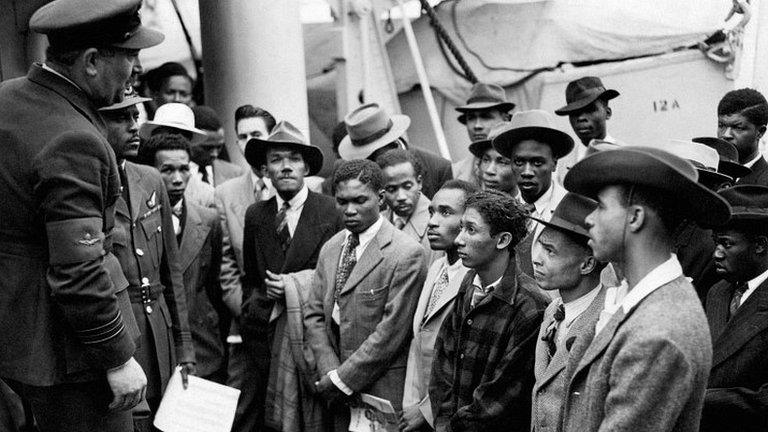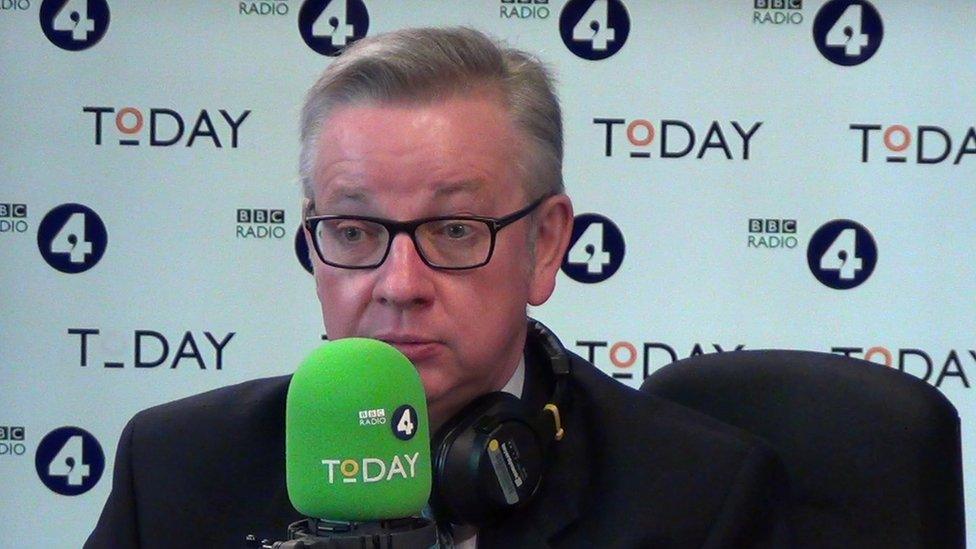Michael Gove: Brexit's not made UK less welcoming to immigrants
- Published

The government has been forced to apologise to the Windrush generation
The UK has a more "welcoming" attitude to immigrants than any country in the EU, Michael Gove has claimed.
The minister told BBC Radio 4's Today the Windrush scandal had not damaged the UK's reputation for tolerance.
And he insisted the Brexit vote he campaigned for had not made race relations worse.
Labour MP David Lammy said his claims were disproved by the "horrendous, heartbreaking" stories emerging from Windrush families.
"Every arm of the state," said Mr Lammy, "has been co-opted into a punitive immigration regime under which the Home Office treats human beings like numbers".
Trevor Phillips, the former chairman of of the Equality and Human Rights Commission, said Mr Gove was one of the most intelligent politicians in Britain "and therefore he cannot possibly believe what he has said".
He said the Windrush scandal had damaged Britain's reputation with potential post-Brexit trading partners around the world, "particularly in the growing markets of Africa and Latin America".
"That is not the way to begin this new era and these new friendships," he told BBC News.

The government has been forced to apologise to the children of Commonwealth citizens, known as the Windrush generation - after the name of the first ship bringing them to the UK in 1948 - for the way they have been treated by the Home Office.
Despite being in the UK legally, many have been threatened with deportation, denied access to NHS treatment, benefits and pensions and stripped of their jobs.
The Home Office has now set up a task force to help them formalise their right to remain in the UK.
But Home Secretary Amber Rudd has faced calls to quit over the scandal, with Labour saying she had blamed officials rather than taking responsibility for her department's actions.
'Pragmatic and liberal approach'
Mr Gove, the Environment Secretary, praised Ms Rudd's "gracious" apology to the Windrush migrants and claimed she had a "grip" on the problem.
And he hit back at claims the voters who backed Brexit in the 2016 EU referendum were motivated by what he called "darker feelings" about immigration and had led to an increase in racism.
"The characterisation of it as somehow having led to worse communal relations or a more hostile attitude to migration - that just isn't borne out by the facts," he said.
"The British people have a robust and pragmatic and liberal approach. They want to welcome people here who want to work."
Mr Gove claimed recent polling by the EU shows "we are the most immigration friendly country in the EU".

Reality Check: Do the facts back up Michael Gove?

Mr Gove's office pointed to a number of surveys, including one from pollsters Ipsos MORI, external in which the UK came top among European countries in thinking immigration has had a positive impact. That report didn't cover all EU countries however.
This month the EU put out a report, external which examined attitudes towards immigration in all 28 member states. Those surveyed were asked a range of questions, including whether they would be comfortable having an immigrant as a friend, neighbour, partner, manager or doctor.
The UK had a more positive attitude than the EU average to immigration, but not the most positive.
That title was taken by Sweden and Luxembourg. And more people in Spain, Sweden, Ireland, the Netherlands and Portugal than in the UK reported feeling comfortable with having a personal relationship with people from outside their home countries.
Meanwhile Brits were more likely than several countries including Spain, Denmark, Sweden and Ireland to describe immigration as "more of a problem than an opportunity".
The MORI poll which surveyed almost 20,000 people across 25 countries in and out of the EU put the UK ahead of Sweden in thinking immigration has had a positive impact, though.
Another piece of research by Ipsos MORI, external published in October found the majority of people in Britain want there to be less immigration, but people's perceptions seem to have become more positive since the referendum. That softening of attitudes is backed up in other pieces of research too.
However, there is a widespread view that the country should be more "selective" about who it lets in. And the gap in attitudes between different groups in society has been growing.

Mr Gove's comments came as the Windrush row continued on Thursday.
The former head of the civil service, Lord Kerslake, has claimed some government ministers were "deeply unhappy" about the introduction of the strategy to create a "hostile environment" for illegal immigrants under then home secretary Theresa May.
The peer, who now advises Labour leader Jeremy Corbyn, said Mrs May's approach to illegal immigration was seen by some ministers as "almost reminiscent of Nazi Germany in the way it's working".
"There were some who saw it... as almost reminiscent of Nazi Germany in the way it's working" - Lord Kerslake
Asked about his comments, Mr Gove said: "It is not for me to criticise a distinguished former public servant like Lord Kerslake, but I respectfully disagree."
Mr Gove said the phrase "hostile environment" had been "paraded around as it it were somehow emblematic of Britain - it's not".
Mr Gove told Today: "My view is that what is emblematic of Britain is the welcome that we gave the Windrush generation, the welcome we gave people fleeing Idi Amin in the 1970s, the welcome that we continue to give those fleeing persecution.
"And now the fact that outside the European Union we can have a truly colour-blind migration policy that, if the British people want to, treats people from the Bahamas in the same way as we treat people from Bulgaria."
Labour MP Chuka Umunna, a supporter of the People's Vote campaign for a EU referendum on whatever UK-EU Brexit deal is agreed, said Home Office figures had shown a "sharp spike in hate crime" since the EU referendum.
Government was warned about impact on older migrants
In a separate development, the BBC's Danny Shaw said the government had been warned about the possible impact of changes to immigration rules on older migrants from the Caribbean.
In October 2015, the Home Office compiled a "Policy Equality Statement" on proposals to restrict illegal immigrants' access to public services, including housing.
It says: "The scheme applies to older people regardless of their country of origin, but some non-UK born older people may have additional difficulties in providing original documentation. Some may have had their immigration records destroyed.
"Some will have originally come into the country under old legislation but may have difficulty in evidencing this. Some may be able to evidence it, but landlords might be unwilling to go to the trouble of verifying unfamiliar documentation."